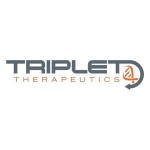TTX-3360, an antisense oligonucleotide delivered by intracerebroventricular (ICV) injection, targets MSH3, a component of the DNA Damage Response pathway
Triplet also highlighted its long-term commitment to patients with a 1% equity pledge to be independently managed
CAMBRIDGE, Mass.–(BUSINESS WIRE)–Triplet Therapeutics, Inc., a biotechnology company leveraging insights from the human genetics of repeat expansion disorders (REDs), today presented preclinical data in Huntington’s disease (HD) for its first clinical candidate TTX-3360, including the therapeutic target and route of administration, in a virtual presentation at the CHDI Foundation’s 16th Annual HD Therapeutics Conference.
Also in the presentation, Triplet underscored its long-term commitment to patients with a pledge to place 1% of its equity into a patient support fund that will benefit the RED community – a first-in-kind commitment in the biotech industry.
TTX-3360, an antisense oligonucleotide (ASO), is the first therapeutic candidate with the potential to modify the course of HD and other REDs by targeting the DNA Damage Response (DDR) pathway.
“TTX-3360 offers great promise and renewed hope for HD patients, who currently have no disease-modifying therapeutic options,” said presenter Irina Antonijevic, M.D., Ph.D., chief medical officer of Triplet. “TTX-3360 targets MSH3, a component of the DDR pathway that sits upstream of mutant HTT to drive disease onset and progression.”
REDs are a group of more than 50 known genetic diseases associated with DNA nucleotide repeats, many of which have been shown to lengthen, or expand, in cells over a patient’s lifetime. A significant body of evidence, including patient genome-wide association studies across multiple indications, supports the role of the DDR pathway as the primary driver of repeat expansion and subsequent disease onset and progression in many REDs, including HD and myotonic dystrophy type 1 (DM1).
Triplet selected MSH3 as its initial DDR target based on the safety profile from knockdown and knockout studies indicating that lowering MSH3 levels in the central nervous system (CNS) by ~50-80% in HD patients is likely to be safe and well-tolerated.
In its presentation, Triplet demonstrated proof of mechanism and additional preclinical safety data for TTX-3360 in non-human primates (NHPs) and in HD mouse models utilizing a rodent sequence-specific ASO (tool ASO) that targets the mouse version of Msh3:
- Msh3 knockdown in normal mice and two mouse models of HD was safe and well-tolerated
- ~50% knockdown of MSH3 with TTX-3360 in HD patient-derived cell lines, and with the tool ASO targeting Msh3 in the HD mouse model, slowed or stopped expansion of mutant HTT repeats
- In NHPs, a therapeutic dose of TTX-3360 was well-tolerated with no adverse effects being observed; safety and tolerability were shown in a dose-escalation and multi-dosing NHP study, suggesting a broad therapeutic index
- A single dose of TTX-3360 delivered via intracerebroventricular (ICV) injection knocked down MSH3 by ~50-80% bilaterally in the caudate and cortex of NHPs for at least 12 weeks
“ICV injection is critical to our goal of slowing or stopping the onset and progression of HD and other REDs,” said Nessan Bermingham, Ph.D., Triplet’s chief executive officer, president and founder. “Unlike the current therapies in clinical development that utilize intrathecal (IT) injection, which primarily delivers therapies to the spinal column and cortex, we use ICV injection to reach the caudate, putamen and other deep brain structures, in addition to the cortex, that are affected early on in HD.”
Since the 1960s, ICV injections have been used safely for the delivery of several therapeutic modalities via a small implanted device that enables convenient and pain-free repeat dosing, with the potential for at-home administration. By contrast, IT delivery requires repeat lumbar punctures (spinal taps) in a clinical setting, which can result in inflammation and scarring that can cause many patients pain during repeat dosing.
Triplet is preparing to submit an Investigational New Drug (IND)/Clinical Trial Application (CTA) for TTX-3360 by year end, with an initial focus on symptomatic pre-manifest and early manifest HD patients, and is planning a Phase 1/2a study of TTX-3360 in these stages of HD. The company then plans to expand TTX-3360 into additional indications, including spinocerebellar ataxias (SCAs) and the CNS aspect of DM1.
Nessan added: “As part of Triplet’s unwavering commitment to our patients, we have pledged to place 1% of our equity, along with equity contributions from me and my wife, into a patient support fund. This independently managed fund will monetize the equity for the benefit of patients suffering from a RED and their families to help secure access to care and therapies.”
About Huntington’s disease
Huntington’s disease is a genetic disorder linked to a mutation in the HTT gene characterized by an increase in the number of CAG repeats within the gene. The presence of these repeats, beyond a certain threshold, wreaks havoc on brain function, affecting mood, cognition and motor skills, ultimately leading to death. Thanks to the contributions of thousands of patients – whose participation in genetic research has built a fundamentally new understanding of the cause of REDs – it is now known that the number of repeat sequences expands over time in patients, increasing the toxic impact on cells, particularly neurons. The DNA Damage Response (DDR) pathway plays a central role in driving this process.
About Triplet Therapeutics
Triplet Therapeutics is a biotechnology company developing transformational treatments for patients with repeat expansion disorders (REDs) – a group of more than 50 known genetic diseases including Huntington’s disease, myotonic dystrophy, spinocerebellar ataxias, fragile X syndrome, and familial amyotrophic lateral sclerosis (ALS) – leveraging insights from patient genetics. Triplet designs and develops potential therapeutics for REDs using its proprietary approach, which enables the Company to develop a single oligonucleotide targeting the DNA Damage Response (DDR) pathway to potentially treat multiple REDs.
Triplet is backed by investments from Atlas Venture, MPM Capital and Pfizer Ventures, along with Invus, Mass General Brigham Ventures and Alexandria Venture Investments. Triplet is headquartered in Cambridge, Mass. For more information, please visit https://www.triplettx.com/
Contacts
Mariesa Kemble
KembleM@mac.com
608-850-4745





















